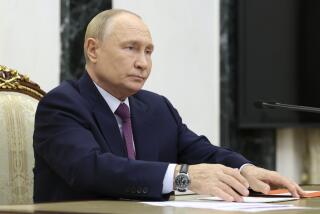Army Limits Methods Used on Detainees
In the face of widening international criticism and congressional scrutiny, the U.S. Army said Friday that it had overhauled interrogation procedures used for Iraqi detainees and banned the use of techniques such as placing hoods over the heads of prisoners or forcing them to stand naked.
Interrogators will also no longer be able to expose prisoners to military dogs, deprive them of sleep or force them to stand or squat in uncomfortable positions -- techniques that have been criticized as beyond the limits of the Geneva Convention. The changes were ordered by Lt. Gen. Ricardo Sanchez, the top military commander in Iraq.
Among the harsher methods, only extended isolation from other prisoners will continue to be allowed, and that will require a commander’s approval, military officials said.
The sudden change in the Army’s interrogation techniques follows worldwide outrage over photos that captured treatment of Iraqi prisoners at the U.S.-run Abu Ghraib prison near Baghdad, where detainees were abused and humiliated.
Investigations into the misconduct have begun to spread to other aspects of military detention practices, including questions about the chain of command at detention facilities and adherence to the Geneva Convention in routine prison interrogation.
Seven military police troops have been accused in the abuse scandal at Abu Ghraib, and several officers have been reprimanded.
The Pentagon has launched criminal and administrative investigations and congressional committees have scheduled weeks of hearings.
Although top Pentagon and administration officials have said the abuse at Abu Ghraib would not have been permitted under any military policy, the Army said it has scaled back interrogation techniques that were considered permissible until this week.
The changes detailed Friday apply only to the interrogation of prisoners in Iraq. Although Defense Secretary Donald H. Rumsfeld and other military officials have said the detainees at the U.S. naval base at Guantanamo Bay, Cuba, are being treated in accordance with the Geneva Convention, they may continue to be subjected to the more stressful techniques now banned in Iraq.
In the most extensive explanation of interrogation techniques in Iraq so far, two senior Army officials briefing reporters at the Pentagon also emphasized that interrogations of witnesses have played a major role in locating roadside bombs, tracking insurgents and capturing key figures.
“I can’t go into specifics, but know that interrogation was a key thing that led to the capture of Saddam Hussein,” said one of the officials, who asked to remain anonymous. “We have gotten some great information on additional terrorist threats in Iraq, on radical Sunni Islamists working with former regime elements and how that working relationship takes place.”
Many of the abuses shown in the recently released photos -- prisoners with their heads hooded, or being menaced by dogs, forced to masturbate or placed in human piles while naked -- were never approved methods of questioning or treatment, and in many cases appeared to be carried out by military police rather than as part of an interrogation, Defense Department officials said.
“There is nothing in this that implies that the behavior in that footage is somehow appropriate,” Pentagon spokesman Lawrence Di Rita said, referring to the rules.
The Army had no specific policy for questioning prisoners in Iraq until Oct. 12, almost seven months after the war began, and until then had used an Army field manual. From October through Thursday, when the new procedures took effect, a policy specifically for Iraq was crafted largely by Army Maj. Gen. Geoffrey D. Miller, based on the interrogation techniques at Guantanamo Bay for international terror suspects.
A copy of an interrogation procedures list posted at the Army’s Joint Interrogation and Debriefing Center was provided to Congress this week. It showed interrogation methods acceptable for all detainees, including direct questioning, incentives, instilling fear, manipulating the prisoner’s pride or ego and other mostly verbal techniques. Such plans were approved by a legal advisor to Sanchez.
An accompanying list of much harsher treatment and physical pressure -- which required a commanding general’s approval for use -- allowed bags to be clamped over prisoners’ heads, “stress positions,” sensory deprivation, dogs and removal of detainees’ clothing.
Many of the questionable techniques have not been used recently, and others were used rarely, said the two senior military officials at the Pentagon. All practices on that list are now banned except the use of isolation, which still requires a general’s approval if used for longer than 30 days.
“Those are things that have been suggested as possible practices, things that came out of the Guantanamo Bay S.O.P. (standard operating procedure)” and elsewhere, said one of the senior officials, who is with the U.S. Central Command, which is directing operations in Iraq and Afghanistan.
Nevertheless, military officials insisted that even the techniques that are no longer approved did not violate the Geneva Convention.
Until this week, the senior Central Command official said, interrogators were advised to “stick to the list of approaches. If you don’t, you’ve got to go to the CG,” or commanding general, to request any of the other approaches.
From October until this week, only 25 such requests were approved -- all for isolation, the officials said. Three other requests were made, all to force detainees into “stress positions.” All were denied, officials said.
However, a number of these techniques appear to have been used by prison guards in Abu Ghraib, based on the photographs that have recently become public. Many show prisoners with hoods over their heads or being threatened by dogs.
Amnesty International issued a statement this week calling on the Pentagon to end all such practices, saying even isolation can violate international law.
“The Bush administration still has not learned that ill treatment and abuses are a slippery slope to torture and should be totally prohibited,” the organization said in a statement.
Rumsfeld and other top Pentagon officials have said that new rules for Iraqi detainees are more restrictive than those in use at Guantanamo.
The policies at Guantanamo have come under increasing criticism as detainees have been released. This week, two former Guantanamo detainees from Britain, Shafiq Rasul and Asif Iqbal, complained of their treatment in a letter to President Bush.
“From the moment of our arrival in Guantanamo Bay ... we were deliberately humiliated and degraded,” they wrote.
They specifically complained of “short-shackling,” being forced to squat without a chair, with their hands chained between their legs to the floor. The men said they were taunted with dogs, masked and left to urinate on themselves, all while being photographed.
They wrote that other inmates were taunted by women, “who would inappropriately provoke and indeed molest them,” the men said.
Di Rita denied that U.S. treatment of detainees at Guantanamo or elsewhere has violated the Geneva Convention.
“The Geneva standard is a baseline standard, and that standard is being met in Guantanamo, and it’s being met in Iraq,” Di Rita said.
Rumsfeld visited Abu Ghraib this week and promised to punish those responsible for the abuse.
Nearly 300 Iraqis were released Friday from the prison. Five buses guarded by U.S. Army Humvees pulled out of the dusty detention center carrying the prisoners. Families of detainees waited for hours, then watched dejectedly as the buses rolled past to release the prisoners elsewhere.
Imad Khalaf, 44, came to pick up his brother Riyadh, who had been arrested nine months ago and accused of hiding weapons and cooperating with the Iraqi resistance.
“They can release them now, what are they waiting for?” he said angrily. “We need our sons, brothers and women to be free right now.”
Once released, the former prisoners wept, prayed and told stories of psychological and physical abuse.
“They kept me in solitary confinement for six days,” Abu Mustafa, 24, told reporters as he emerged from 10 months of captivity. “They hung me by my hands from the wall for five hours.”
The Army said it would free another 475 prisoners May 21.
Times special correspondent Saif Rasheed and researcher Ammar Mohammed in Baghdad contributed to this report.
More to Read
Sign up for Essential California
The most important California stories and recommendations in your inbox every morning.
You may occasionally receive promotional content from the Los Angeles Times.










